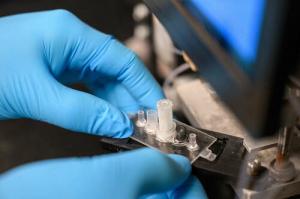Notre Dame researchers reveal advanced nanoparticle technology for fast, accurate detection of heart disease and brain cancer, improving diagnostic precision
NOTRE DAME, IN, UNITED STATES, October 10, 2024 /EINPresswire.com/ -- The University of Notre Dame announces significant progress in the use of biological nanoparticles for precise and rapid disease detection. Recent studies highlight how lipoproteins and extracellular vesicles can be utilized as biomarkers, leading to more accurate diagnosis of heart disease and brain cancer compared to traditional methods.In a recent study published in Nature Communications, researchers demonstrate that lipid nanoparticles, specifically PON1-HDL, provide a more reliable indicator for heart disease than conventional cholesterol tests. "It's not just about accurate measurement; it's about measuring the right markers," stated Dr. Sonu Kumar, lead author of the study. "Traditional markers like cholesterol aren't as robust as PON1-HDL, which is more effective in our tests."
This approach is also being applied to brain cancer diagnostics. By focusing on identifying an active variant of the Epidermal Growth Factor Receptor (EGFR) protein, the researchers have developed a method to differentiate between glioblastoma patients and healthy individuals. This process is non-invasive, using blood samples to detect cancer-specific biomarkers.
At the core of this technology is a biochip that employs electrokinetic technology to identify key biomarkers such as EGFR and PON1-HDL. These markers are frequently overexpressed in diseases like glioblastoma and heart disease and are detectable within extracellular vesicles. The biochip, which is about the size of a ballpoint pen tip, uses an electrokinetic sensor that can bind multiple antibodies to a single extracellular vesicle. This enhances the sensitivity and specificity of the diagnostic.
The research is a collaborative effort involving several institutions, including Vanderbilt University and the Olivia Newton-John Cancer Research Institute in Australia. Dr. Sonu Kumar, the primary researcher, and Dr. Hsueh-Chia Chang, the lead investigator at Notre Dame, spearheaded this development.
What distinguishes this biochip from traditional diagnostic tools is its use of electrokinetic forces, which allows for highly sensitive detection without requiring complex sample preparation or expensive equipment. The simplicity and efficiency of this technology make it a scalable solution, particularly valuable in resource-limited clinical settings.
The next steps for the research team include optimizing the biochip for widespread clinical application and expanding its use to detect biomarkers associated with other conditions, such as neurodegenerative and autoimmune diseases. With further development, this platform has the potential to become a universal tool for rapid, accurate diagnostics across multiple medical fields.
Brandi Wampler
University of Notre Dame
bklinger@nd.edu
Legal Disclaimer:
EIN Presswire provides this news content "as is" without warranty of any kind. We do not accept any responsibility or liability for the accuracy, content, images, videos, licenses, completeness, legality, or reliability of the information contained in this article. If you have any complaints or copyright issues related to this article, kindly contact the author above.
© 2024 Benzinga.com. Benzinga does not provide investment advice. All rights reserved.
Comments
Trade confidently with insights and alerts from analyst ratings, free reports and breaking news that affects the stocks you care about.
